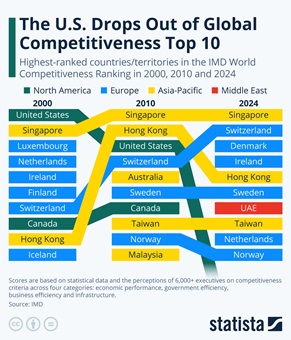Oregon continues to be used as a testing ground for radical ideas
The United States has dropped out of the top 10 in the global competitiveness rankings for the first time, according to the International Institute for Management Development (IMD) World Competitiveness Ranking. The ranking, which is based on a variety of factors including economic performance, government policies, and business environment, has been released annually since 1989.
Biden Economics has been experiencing a decline in competitiveness over the past few years, due to various factors such as:
- Social cohesion - increasing polarization and a lack of social cohesion, which can make it difficult for the country to adapt to changing circumstances.
- Adaptability and agility - slow to adapt to changes in the global economy and has been slow to respond to emerging challenges.
- Government and business efficiency - slow-moving legislative process and inefficient government bureaucracy, which can make it difficult for businesses to operate effectively.
The decline in competitiveness has significant implications for states. How the U.S. addresses the underlying issues and take steps to improve its competitiveness will affect Oregon significantly. As the U.S. declines in competitiveness, it leads to loss of state’s influence in global markets with a reduced ability for Oregon to sustain its international trade policies. Lack of competitiveness most likely will lead to economic stagnation that reduces the ability to create jobs and stimulate economic growth.
BRICS was started because of economic sanctions, which has resulted in a forced marriage of Russia to China, Oregon’s
largest export partner, with sales in 2021 totaling $10.6 billion, a third of all the state’s exports is with China. A decline in competitiveness will make it more difficult for businesses to compete with countries that are more competitive and have a more favorable business environment.
Economic sanctions on Russia has accelerated the demise of the dollar. Recently, the U.S. Treasury slapped an economic sanction on companies and financial institutions that do business with Russia. Poking at the bear when he has nuclear ships off the coast of Miami could be dangers. Biden put a pinch on imports of natural resources, aluminum, gas needed for manufacturing, and fertilizer needed for crops that are all imported from Russia, which directly affects Oregon's economy.

The chart is also an indication that forcing U.S. Employers to hire based on a DEI agenda rather than the quality of work is eroding in moral decay. Economist Dr. Elliott says, “Of course we aren’t going to be in the top 10 with that theology. I call it a theology because this DEI mantra is a religion to them… We are celebrating being the opposite of God in this country and that isn’t good for the economy… Biden is dedollarizing America by his policies.”
The housing market is suffering from supply and demand destroying the balance, and projected to be worst than it has ever been. Rentals are going up, caused by banks undercapitalized by 55 trillion for each Goldman Sacs and Chase with two others close behind. Hedge fund managers are selling off faster than during covid, wages are down, unemployment is up, taxes are up, interest rates and cost of borrowing is up that puts housing in a squeeze. Governor Kotek's housing goals may be a lost cause if banks aren't able to make loans, coupled with the need to import lumber due to the restrictions on harvesting by the Oregon State Land Board.
A D V E R T I S E M E N T

A D V E R T I S E M E N T
If Biden continues pushing the Democrat agenda, we can expect Putin to retaliate. This isn’t a Biden’s agenda, he is simply the current face being used. It doesn’t matter who is president, if they are a Democrat, the policies won’t change. Democrat states follow the same agenda. Oregon's leadership is in step with Democrat policies and repeatedly uses Oregon as a testing ground for some of these radicle ideas.
In 2019, Oregonians held in opposition to cap and trade when legislative bill
HB 2020 was proposed. In a last minute effort, Senator Betsy Johnson (D-Scappoose) proposed sweeping amendments as the most vocal cap-and-trade skeptic. Johnson was removed as co-chair of the Ways and Means Committee in a power play to vote the bill out of committee. After passing the House, the Senate walked out to prevent a vote. The bill died, but not cap-and-trade. Governor Brown circumvented the legislative process with
Executive Order 20-04, which was directed at state agencies but contained much broader provisions sharply curbing greenhouse gas emissions that exceeded the bill. It opened the door to further legislation and rules on emission standards that is now a step towards eliminating natural gas in
SB 98, and regulation of hydropower impacting water usage for small farms in
SB 85.
Even though Oregonians have defeated a sales tax nine times, it may have cost less than all the hidden sales taxes and fees that have been passed piece-by-piece, including gas tax, cell phone tax, grocery bag fees, lodging taxes, corporate access Tax (CAT), carbon credit markups, to name a few. As one of the highest taxed states, Ernst & Young found that Oregon’s state and local business tax burden has increased by 45% since 2019. Oregon's regulatory environment contributes to losing it's reputation for being business friendly and lead to a 2.0% reduction in
new business filings last year. Oregon's recovery depends on voters, and the need to break from current policies.
--Donna Bleiler| Post Date: 2024-07-10 10:46:34 | Last Update: 2024-07-10 13:47:37 |







 The chart is also an indication that forcing U.S. Employers to hire based on a DEI agenda rather than the quality of work is eroding in moral decay. Economist Dr. Elliott says, “Of course we aren’t going to be in the top 10 with that theology. I call it a theology because this DEI mantra is a religion to them… We are celebrating being the opposite of God in this country and that isn’t good for the economy… Biden is dedollarizing America by his policies.”
The chart is also an indication that forcing U.S. Employers to hire based on a DEI agenda rather than the quality of work is eroding in moral decay. Economist Dr. Elliott says, “Of course we aren’t going to be in the top 10 with that theology. I call it a theology because this DEI mantra is a religion to them… We are celebrating being the opposite of God in this country and that isn’t good for the economy… Biden is dedollarizing America by his policies.”
